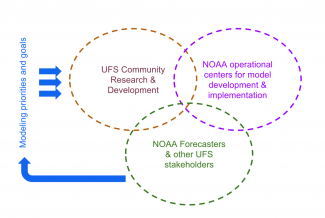With the advent of the Unified Forecast System (UFS), the operational model development at the National Weather Service (NWS) is increasingly becoming a collective effort that includes contributions from multiple NOAA labs, national agencies, and university research groups. The NWS forecasters are the primary stakeholders of the UFS’ operational forecast products, and therefore, continued engagement with them is important for staying abreast of the real-world performance of the model and its utility in society. Feedback from forecasters is another a key driver that informs the NOAA funding offices on model development priorities. For the purposes of these modeling-oriented workshops, the NWS Center and Regional Offices served to represent the broader state, local, and private forecast community.
- Figure: Engaging stakeholders in the UFS: Feedback from forecasters and other stakeholders help us better understand model performance and errors, and thereby define development priorities. For a successful community model development and transition to operations, close coordination between (1) the UFS research and development efforts, (2) the operational model development and implementation organizations (NCEP’s Environmental Modeling Center and Central Operations), and (3) the forecasting community is essential.
The NWS Office of Science and Technology Integration (OSTI) Modeling Program Division conducted three workshops for forecasters during 2020-21. The key objective was to identify forecasters’ top priorities and modeling gaps, particularly focusing on the UFS Medium Range Weather/Subseasonal to Seasonal (MRW/S2S) global and Short Range Weather (SRW) regional Applications (See more on UFS Applications here).
The first workshop (held on November 16, 2020) solicited forecasters’ concerns, which were organized under a set of topics including convection, winds and terrain issues, precipitation, floods and hydrology, tropical cyclones, visibility, marine/coastal issues, temperature and air quality, and space weather. These concerns were later synthesized and shared with the UFS model developers and evaluators. The follow-up workshops held on January 29, 2021 and February 11, 2021 further addressed these concerns as relevant to the evolution of the UFS Medium Range Weather (MRW) and Short Range Weather (SRW) Applications, respectively. These two follow-up workshops, led by the UFS Application leads, along with operational model developers and evaluators at the NCEP EMC, focused on connecting the forecasters’ concerns with model-specific issues and known biases.
The key outcome of the workshop is a finalized list of forecasters' requests for the UFS MRW and SRW Applications that consists of a total of 23 issues classified under 7 major topics, which are 1) Surface temperature and moisture, 2) Precipitation, 3) Convection, 4) Winds, 5) Tropical cyclones, 6) Marine waves, winds, and sea ice, and 7) Space weather.
Overall, the workshops elevated the UFS community to a new level of synergetic coordination that strengthened the link between model development and forecasting challenges. Discussions between the forecasters and the modelers proved fruitful in that many forecast issues that appeared as independent disconnected items at the beginning of the meeting could later be tied to a few underlying model issues. Some of the development priorities that emerged are Boundary Layer (BL) over the land and ocean, air-sea coupling, land-surface processes, land initialization, microphysics and sea ice, and marine winds and waves. The Model Evaluation Group (MEG) at the NCEP EMC, played a pivotal role in bringing some of the key underlying issues to the forefront.
While the above list is a starting point, the UFS community and NOAA Program Offices are committed to continuing the conversation and facilitating opportunities for ongoing engagement between the modeling and the forecaster communities.
The contributing author team includes
Hendrik Tolman, NOAA / OSTI,
Deepthi Achuthavarier, NOAA / OSTI,
Geoffrey Manikin NOAA / EMC,
Jason Levit, NOAA/ EMC,
Linden Wolf, NOAA / OSTI, and
Farida Adimi, NOAA / OSTI.
